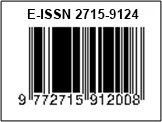KNOWLEDGE MANAGEMENT DALAM KERANGKA PENGEMBANGAN KOMPETENSI STAF SUMBER DAYA MANUSIA KEPOLISIAN NEGARA REPUBLIK INDONESIA
Abstract
This research aims to examine the application of knowledge management in developing the competence of human resources staff within the Indonesian National Police (Polri). It analyzes relevant factors, including human resources, leadership, and organizational technology, through the lens of supporting conditions. The research employs a case study methodology, utilizing document analysis, interviews, and observation for data collection. The findings reveal that the implementation of knowledge management is not yet optimal. Regarding the human factor, it was discovered that the motivation to share knowledge is low due to the absence of incentives. In terms of leadership, the lack of commitment from leaders is evident in the absence of clear regulations. Concerning technology, various applications have been developed, but there is a lack of content or knowledge that supports daily work capabilities, such as standard operating procedures (SOPs). This research proposes a model for implementing knowledge management within the framework of competence development. This model comprises competence development planning with database strengthening (externalization), competence development implementation through knowledge transfer (socialization and internalization), and competence development evaluation by enriching modules and content (combination).
References
Dubois, D. D., & Rothwell, W. J. (2004). Competency-Based Human Resource MAnagement. In Published by Davies-Black Publishing, a division of CPP, Inc., 1055 Joaquin Road, 2nd Floor, Mountain View, CA 94043; 800-624-1765 (first prin, Vol. 13, Issue 1). Published by Davies-Black Publishing a division of CPP, Inc., 1055 Joaquin Road, 2nd Floor, Mountain View, CA 94043; 800-624-1765.
Hendrawan, M. R. (2020). Manajemen Pengetahuan: Konsep dan Praktik Berpengetahuan Pada Organisasi Pembelajar (Edisi 1). UB Press, Malang.
Heri, E. I. (2019). Tantangan Pengembangan SDM Polri di Era Revolusi Industri 4 . 0. Jurnal Ilmu Kepolisian | Volume 13 | Nomor 2 | Agustus 2019, 13.
Hidayah Endang, E. all. (2021). Tantangan pengembangan kompetensi aparatur sipil negara (ASN) menuju “Low Cost Training (LCT)” dalam Mewujudkan Reformasi Birokrasi. 9(2), 117–127. https://doi.org/10.33701/jmsda.v9i2.2014
Horton, S., Hondeghen, A., & Farnham, D. (2013). Competency Management In The Pblic Sector. In Paper Knowledge . Toward a Media History of Documents.
Nasikhin, M. A., & Danila, N. (2018). The Impact of Knowledge Management on Work Performance through the Employees’ Competence: A Case Study of “MP” Bank. Journal of Economics, Business & Accountancy Ventura, 20(3). https://doi.org/10.14414/jebav.v20i3.1135
Nawawi, I. (2012). Manajemen Pengetahuan (Knowledge Management). Ghalia Indonesia, Bogor.
Olusegun Julius, K. M. (2021). Identified Human Factors in Knowledge Management in the Context of Knowledge Sharing. Turkish Journal of Computer and Mathematics Education (TURCOMAT), 12(3), 1963–1968. https://doi.org/10.17762/turcomat.v12i3.1031
Poór, J., & Bencsik, A. (2018). Knowledge management in human resource management : Foreign-owned subsidiaries ’ practices in four CEE countries. 11, 295–308. https://doi.org/10.14254/2071-8330.2018/11-3/23
Prasojo, E., Zulkarnain, Z. P., Yunairi, R., Mulyadi, A., & Hariyati, D. (2021). Training Needs Analysis Anggota Polri. Universitas Indonesia – Center for Study of Governance and Administrative Reform (UI-CSGAR), April 2021, 1–5.
Soepardy, A. T. (2020). Pengaruh Knowledge Management Terhadap Sustainable Livelihood. Jurnal Ilmiah Akuntansi Manajemen, 3(1), 68–77. https://doi.org/10.35326/jiam.v3i1.616
Spencer, L. M., & Spencer, S. M. (1993). Competence at work: models for superior performance.
Copyright (c) 2024 Jurnal Academia Praja : Jurnal Magister Ilmu Pemerintahan

This work is licensed under a Creative Commons Attribution-NonCommercial 4.0 International License.
Copyright Notice
The Authors submitting a manuscript do so on the understanding that if accepted for publication, copyright of the article shall be assigned to Jurnal Academia Praja, Department of Master of Governmental Sciences, Faculty of Social and Political Science, Universitas Jenderal Achmad Yani as publisher of the journal.
Copyright encompasses rights to reproduce and deliver the article in all form and media, including reprints, photographs, microfilms, and any other similar reproductions, as well as translations.
Jurnal Academia Praja, Department of Master of Governmental Sciences, Faculty of Social and Political Science, Universitas Jenderal Achmad Yani and the Editors make every effort to ensure that no wrong or misleading data, opinions or statements be published in the journal. In any way, the contents of the articles and advertisements published in Jurnal Academia Praja are the sole and exclusive responsibility of their respective authors


















